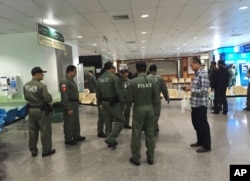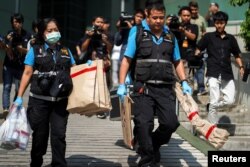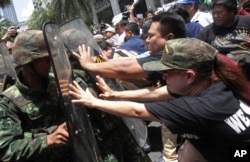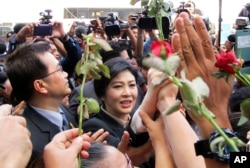A bomb blast at the military training hospital in central Bangkok this week coincided with the third anniversary of the rise to power of the present military leaders in the May 2014 coup.
The 2014 coup brought an end to months of street protests against the civilian government led by Yingluck Shinawatra, with the junta promising early elections.
Monday’s bomb blast in a reception room of the hospital left 25 people injured, some seriously, from shrapnel wounds and broken glass.
The blast is the third since early April and so far no one has claimed responsibility for the attacks.
Investigation of 'inhumane act'
Panitan Wattanayagorn, a security advisor to the Deputy Prime Minister Prawit Wongsuwan, said the police investigations were making headway, accessing closed circuit TV footage and intelligence agency reports.
“The incident may be conducted by some groups who are quite experienced so [authorities] are now beginning to narrow down the possibilities of these suspects [able] to make a bomb this way and to target a hospital this way, it comes down to just a few groups only in Thailand that can be able to do this,” Panitan told VOA.
The bombing was condemned by political parties and human rights groups. Thailand National Human Rights Commissioner Angkhana Neelapaichit called the attack “an inhumane act.”
New York-based Human Rights Watch said the bombing of a hospital that also treated civilians was “an unjustifiable act of lawlessness.”
Political parties and opponents of the military government were also quick to condemn the bombing.
Speculation about divisions in military
But Somarn Lertwongrath, a senior member of the Pheau Thai Party, denied politicians’ involvement in the bombings, but adds the attack raises concerns of divisions within the armed forces.
“I think the military themselves have a problem now at the moment. I think there will be more attacks soon,” Somarn told VOA.
On Tuesday reports said security officials had placed the northern city of Chiang Rai on high alert after the Bangkok bombing with stepped up security.
Government advisor Panitan said " it depends on the public at large if they feel threatened, if they [have to] change their ways of life, if they become the victim of these kinds of acts,” Panitan said.
Tight control since 2014
Thailand’s political landscape has been kept under wraps since May 2014, with the government making dozens of arrests of those critical of the government or of charges of Lèse Majesté, through criticism of the Thai Royal Family.
The populist parties led by former Prime Minister Thaksin Shinawatra — himself ousted in a 2006 coup — and his younger sister Yingluck Shinawatra, frequently challenged the existing political order of military and bureaucracy.
This in turn triggered street demonstrations as pro-Thaksin governments faced accusations of corruption and abuse of power.
Since 2014 the military has kept a tight grip on power by arresting activists, threating political parties and dozens have been charged under tough laws protecting the Royal family as well as a tight reign over the media and online websites.
New constitution will still have strong controls
A new constitution passed by a referendum last year is being completed with the passing of organic laws through the National Assembly before a general election slated for late 2018.
But charter critics say tight constitutional restrictions over the role of political parties, a non-elected upper house or Senate, a non-elected prime minister, and military representatives in the senate, have all raised concerns.
The military has found support in the central regions, especially within Bangkok, after years of political street demonstrations.
But in the north and northeast, political loyalties remain with the parties linked to former Prime Minister Thaksin.
Criticism of military rule
Ubon Ratchathani University lecturer, Thitipol Phakdeewanich, said the military’s tough stance in the northeast undermines the political atmosphere ahead of the elections.
“We need a democratic environment not a kind of authoritarian environment before democracy. Because everything is under control how can we ensure that we would actually have a good result in the elections,” Thitipol said.
But Democrat Party senior leader Kiat Sittheeamorn said once a government is in place, opportunities for charter reforms may occur.
“Everyone now understands the situation a bit better, so whoever is elected to run the next government they will have to be very cautious, but yet at the same time they have to follow a certain strategy that is outlined [in the charter],” Kiat said.
Thailand’s democratic outlook will remain guided by the military, whose role in the parliament will extend over the next five year transition period.
Gotham Areeya, a lecturer at Mahidol University, said the military’s influence will be extended for some time.
“It would be democracy Thai military style for a while. So what I call liberal democracy has to wait. So the so-called Thai military style of democracy trying to impose itself through the new constitution and also through the control of the media, and they review legislation. So it’s kind of a legal state – the use of law not really the rule of law,” Gotham said.








